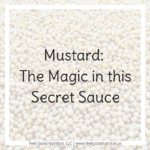 Did you know mustard is a relative of cabbage, broccoli and radishes?
Did you know mustard is a relative of cabbage, broccoli and radishes?
This family of vegetables is the Brassica family and has very potent health benefits and mustard has been one of favorites to focus on lately. I have been finding places to put ground mustard, mustard greens, and even yellow mustard on foods whenever I can. Let me tell you why!
Benefits of Mustard Greens
Mustard greens appear in the top four vegetables that are especially high in phenols. Phenols are chemical compounds that have strong inhibitory effects against the mutation of cells and formation of cancer. Other cancer fighting compounds in mustard greens are antioxidants. These substances prevent cell damage that leads to mutations in DNA and can be very dangerous to the body.
Mustard greens also has benefits directly in your liver and your blood. They are potent detoxifiers and can cleanse the liver and the blood by pulling environmental toxins from the blood stream, neutralize heavy metals and help eliminate pesticides from your body.
Other benefits of mustard greens:
- High in fiber, which can help control cholesterol levels by interfering with absorption in the gut. Fiber also helps lower the amount of toxins in your digestive tract by lowering high blood pressure
- High in vitamin K, which is a major vitamin important in bone building, blood clotting and removing calcium from places that it shouldn’t be.
- Over 50% of your daily vitamin C in 1 cup of mustard greens, which is important in the body’s repair process. Vitamin C can help prevent cell damage, maintain healthy tissue build collagen and maintain blood vessels.
NOTE: If you are taking a blood thinner (warfarin/coumadin) talk with your doctor before consuming foods high in vitamin K.
Benefits of Mustard Seed
Mustard seed is used as whole seeds or ground up into a fine powder, which is what gives the mustard condiment its spicy taste.
Mustard seed, like other vegetables in the Brassica family, contain a phytonutrient called glucosinolates as well as an enzyme called myrosinase. When this phytonutrient and enzyme come together during the chopping, chewing, or grinding process they form another phytonutrient called isothiocyanates.
Glucosinolates + myrosinase = isothiocyanates
Eating high amounts of these phytonutrients have been shown in animal studies to inhibit the growth of cancer calls and protect against the formation of new cells.
This benefit only applies in the raw vegetable/spice. When heated, the myrosinase enzyme is denatured (killed off) and the vegetable does not have a chance to create isothiocyanates. For this reason, anytime I cook a vegetable in the Brassica family, I have been adding mustard powder after cooking. This readds the myrosinase enzyme back into the food so that it can work with the glucosinolates to create isothiocyanates.
Mustard seeds are also a great source of other nutrients:
- 1 Tablespoon of Mustard powder has 25% of your daily needs of selenium. This mineral helps reduce the severity of asthma, helps prevent cancer and decreases symptoms of rheumatoid arthritis.
- There is a higher amount of omega-3 fatty acids compared to omega-6 fatty acids which is an unusual find in our food supply. Omega-3 fatty acids have numerous anti-inflammatory benefits and on average we are getting more omega-6 fats in our diets than we really need.
A couple of ways to start adding mustard to your day!
Sprinkle mustard seed on your cooked Brassica vegetables: cauliflower, cabbage, broccoli, Brussel sprouts, kale.
Add whole mustard seed to a coleslaw recipe.
Add some Dijon mustard to your favorite vinaigrette dressing.
Use Rachel Schultz’ recipe and mix Dijon mustard with maple syrup for a marinade on chicken
Marinade salmon fillets in Dijon mustard and white wine.
Resources:
http://www.whfoods.com/genpage.php?tname=foodspice&dbid=106
http://nutritiondata.self.com/facts/spices-and-herbs/194/2